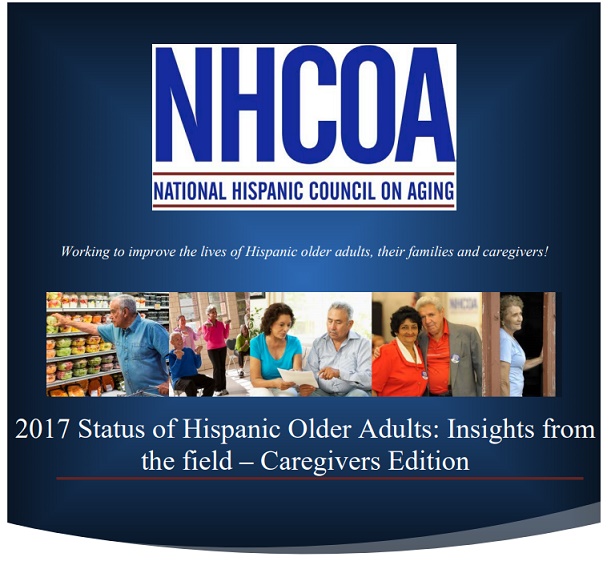
Click here to read and download NHCOA’s new report, “2017 Status of Hispanic Older Adults: Insights from the Field – Caregivers Edition”
Building on the findings presented in the 2017 Status of Hispanic Older Adults: Insights from the Field – Caregivers Edition, the National Hispanic Council on Aging (NHCOA), has developed a number of recommendations for local, state, and national leaders.
NHCOA forwards the following recommendations to better support Hispanic/Latino older adults by ensuring adequate training and care for their caregivers, and would like to urge and encourage members of Congress to support these important pieces of legislation that impacts their older Hispanic constituency:
- Bipartisan passage of R.947 and S.337, the Family and Medical Insurance Leave Act (the FAMILY Act).
- Bipartisan passage of S 1028, the Recognize, Assist, Include, Support, and Engage (RAISE) Family Caregivers Act.
“Latino low-income family caregivers spend about 44% of their income on caregiving; therefore NHCOA is working to create awareness about the need to approve the RAISE Family Caregivers Act. Our goal is to propose a national strategy that supports and meets the real needs of Hispanic families who care for their loved ones”, said Dr. Yanira Cruz, President of NHCOA.
In addition to the data and testimonials from seniors in different parts of the country, the report details several policy recommendations, including preserving and expanding programs that address retirement security among the aging U.S. population, and ensuring that programs & benefits address the cultural and linguistic needs of the growing Hispanic aging population:
- Promote strategies that encourage employers to support caregivers so they can continue to work while caring for a loved one.
- Increase affordable and quality housing for seniors.
- Promote strategies to inform and educate Hispanic older adults and their caregivers on the issues of Alzheimer’s disease and HIV prevention.
- Due to the tragedy that is affecting the people of Puerto Rico we urge FEMA and other government agencies to work in protecting our Hispanic seniors there and to send immediate help to the island.
The report highlights the NHCOA Regional Conferences. In 2017, NHCOA implemented three regional conferences in Miami, Silver Spring, and Los Angeles. The focus of these regional conferences was to provide a linguistically and culturally safe space for attendees to discuss community driven solutions to important issues facing Hispanic communities with special emphasis on Hispanic caregiving. The goals of these conferences were to gather information about the role of Hispanic caregivers and how to effectively support them in their roles while also advocating for local and national level policies that reduce the financial, physical and mental burden of caregiving. These conferences featured panel discussions of key issues faced by Hispanic older adults and their caregivers which opened the floor to group discussions and possible solutions.
“We provide an overview of the data we collected from the National Caregivers Survey. The goal of our survey was to understand the demographics of Latino caregivers, describe the challenges caregivers face, and recognize what resources are needed to aid caregivers in their roles. About 40 million family caregivers provide about $470 billion annually in unpaid care to their loved ones. In 2015, out of the 43.5 million people that have provided unpaid care to an adult or child, 9.1 million were Latinos. In other words, non-white Hispanic caregivers have the highest reported prevalence of caregiving among any other race or ethnic group,” added Dr. Cruz.
NHCOA Board Chair and former Deputy Assistant Secretary of the U.S. Department of Health and Human Services Administration on Aging, Cindy Padilla, moderated a panel of experts and community leaders including:
Dr. Matthew Y.C. Lin – Deputy Assistant Secretary for Minority Health
Rhonda S. Richards – Senior Legislative Representative for Health and Long Term Care, AARP
Allyson Schwartz – President and CEO, Better Medicare Alliance
Zachary Bastian – Manager, Strategic Alliances, Verizon
Margarita Navas – NHCOA
This data and testimonial driven report is the only one of its kind that compiles information on how U.S. Hispanic older adults and their caregivers are faring in terms of indicators of wellbeing. Click here to read, download, and share the report.
The opinions expressed in this article are those of the author and do not necessarily reflect those of the Diverse Elders Coalition.

